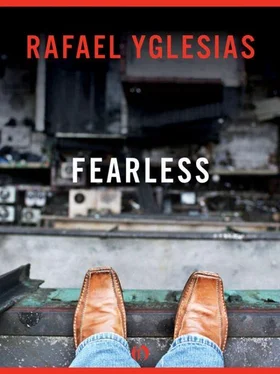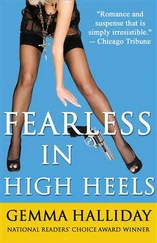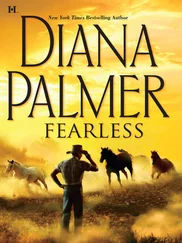“Yeah! She’s the one you gave the baby to,” he said to Max, excited.
“You saw that? I thought you were with the Red Cross by then,” Max argued. He was worried by this child’s determination to reshape what they had experienced into something that couldn’t fit into his own memory.
“I was watching you from the ambulance!” Byron explained. He turned to Jonah to tell him this amazing fact: “Your Dad just walked out of the airport.”
“Um,” Peter signaled he had something important to say, “the mother, her name is Paula Pavod — I think that’s how you pronounce it — said she knew that you had also rescued Byron and so she was calling us in case we knew who you were. We gave her your name, or rather Byron did — I hope you don’t mind.”
And so, because of Paula Pavod and other survivors, by the next morning Max was considered to be a hero — and not merely the savior of Byron and the Pavod baby. He was also supposed to have played pied piper to another twenty or so passengers lost in the burning plane. Max found out that he was a public figure at seven-thirty in the morning on his way out to put Jonah on his bus to day camp. The doorman showed Max a New York Post that credited him with saving four children, an elderly woman, and a flight attendant. Max was surprised that the Post had assembled all these accounts of his rescue efforts without speaking to him. But the Daily News explained the lack of contact with its headline, GOOD SAMARITAN SAVES TOTS AND DISAPPEARS, again shown to him by the doorman. Max stopped inside the outer doors, reading the News to find out where the press thought he was. Jonah poked him in the side.
“Dad! Look who’s here.”
From their position they could see the Eighty-fourth Street corner. There a mob had gathered, at the center of which were two television crews interviewing, of all people, Byron.
Byron and his diffident father had been waylaid as they got out of a cab intending to visit Max again. The boy’s insomnia had continued even after last night’s get-together; he had refused to attend his day camp (a different one from Jonah’s, thank goodness) unless he saw Max first. Byron’s father had tried to call ahead but Debby had taken the phone off the hook before going to bed and he couldn’t get through.
Max was immediately sucked into being interviewed with an eager Byron by his side. And so he had his revelation that Jeff deserved to die while denying his own heroics. Besides, his revelation wasn’t irrelevant to Kaku’s questions; in fact, she provoked his silent verdict. She asked Max his reason for switching his seat to be with Byron, and that emphasized to him why his decision on Jeff’s fate was so important. Max had deserted his dead partner. He knew he was ashamed of his desertion because he had concealed it from Nan. That hadn’t been difficult; she didn’t ask about how Jeff died, presumably too upset to hear details. And now Nan would learn it from the tabloids, find out in big black type that her husband’s best friend had left him to die alone. This false life Max had returned to, this ghostly existence that he inhabited only in form and not in substance, was overcrowded with people, errands and moral ambiguities. While he said to the reporters, “No, I didn’t pull an old woman out from between seats. No, I didn’t rescue a brother and sister who were buried underneath dead bodies. No, I didn’t pull the baby out of a burning seat. No, I didn’t show the way out for dozens of people. No, I didn’t leap into flames to save Byron,” while he fended off their accusations of heroism he sagged at the dreary list of chores ahead: he had to go to the office; he had to call Nutty Nick; he had to get Jonah on the camp bus.
In fact, the bus had come and, atypically, was waiting patiently. Jonah’s campers peered in awe at the mob of cameras and celebrity television reporters. A friend called and waved to Jonah.
“Dad!” Jonah interrupted another of Kaku’s hostile questions. She was still convinced that Max wasn’t giving her everything. “Dad, can I get on my bus?”
Max bent over to give his boy a hug goodbye; he was immediately pushed back by his son’s hand. He escorted Jonah to the bus. The mob of reporters (led by Kaku) and gawkers inched along with them. He waved goodbye and felt he was alone, more alone than ever, more alone even than when he had showered in the Sheraton and understood that Jeff was gone and his life was forever changed. Once the bus drove off, the reporters crowded him again. He backed away a few feet. They moved after him in a carnivorous movement, a hungry herd. Max felt hot and he couldn’t breathe. His legs wanted to go. He abruptly turned the other way on West End and broke into a full run, ignoring the shouts from abandoned reporters and forgetting as well that he had promised Debby he would have a leisurely breakfast with her.
He remembered five blocks later. He saw a phone booth on Riverside and ran to it.
“Hello.” Debby was angry, prepared to hang up.
“Hi, it’s me.”
Her tone changed: anger to relief. “Where are you?”
“There’s a mob — I’m not kidding you — a mob of reporters downstairs—”
“Oh, the phone has been ringing nonstop. I tried to call my mother and it started. Really. I can’t even begin to dial. They say you saved all these people. Is that true? Why aren’t you telling me these things? You just say you got this boy out—”
“It’s not true. I did carry a baby out. But he was right next to me. Not — I don’t know — buried in the flames or whatever the hell they’re saying—” he sighed. The gray plastic receiver smelled of sauerkraut, a peculiar odor for eight in the morning.
“Max.” Debby had the irritation back in her tone. “Where are you?”
“Uh, I’m on Riverside Drive.”
“Max.” She said his name as if making a statement about his character, with a note of finality. “Come home.”
Last night they had lain together after Jonah went to sleep. They made love in slow motion. Her orgasm was as gentle and suppressed as a child sobbing into a pillow. Max, although he was fully erect and felt each detail of the pleasure of being inside her, couldn’t climax. He was embarrassed and annoyed. Debby pulled at him to continue but when he did it was she who was again moved into passion and release, this time bucking and moaning with joy. They stayed joined for a time in the dark, lying still while Max waited — for what he didn’t know.
“What’s wrong?” she asked.
He pulled out: stiff, alive, and unsatisfied.
“I’m frigid,” he said.
She held his penis and kissed him. “What can I do?” she said.
He laughed.
“What do you want?” she asked.
“I want you to save me,” he said.
But she didn’t know from what or how and he didn’t either. She got sadder and sadder as she asked questions that sounded straight out of a self-help book or from a therapist’s mouth. It seemed to Max as if his being alive made his wife sad. He tried to convince himself she was unhappy at the thought he had almost died, but he didn’t succeed. She was disappointed in him. She had been disappointed in him for years. He didn’t know why. Probably because he was her life, or a great part of it, and that life, the life of a thwarted artist, was a letdown. But what did these distinctions matter? The end was the same: she would be better off with him dead; then his absence, not his presence, would be what made her sad.
Think of Nan. She had never shown anything but annoyance or disdain for Jeff and yet last night, as his widow, she had been magnificent in her love.
“He was my big boy, my crazy boy,” she mumbled in Max’s ear. “We were just kids when I married him and we fucked it up,” she choked, her warm breasts palpitating against Max, her strong hands digging into his back. Nan cried on Max’s shoulder but the passion of her grief reminded him more of lovemaking than of sorrow.
Читать дальше












